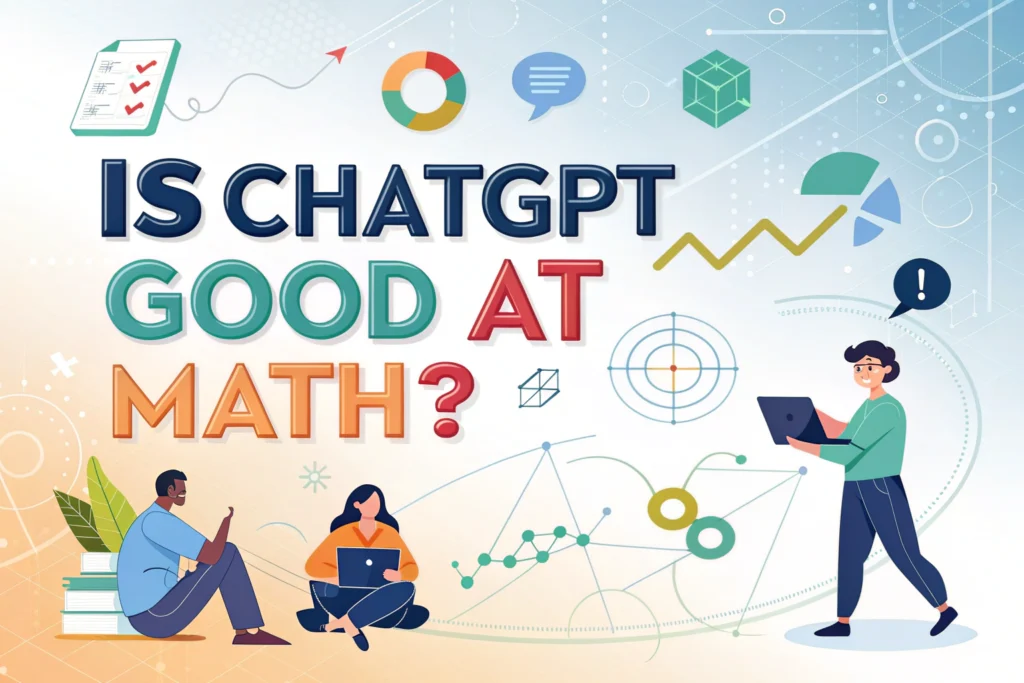The short answer: ChatGPT is not inherently good at math. Since it is a large language model (LLM), ChatGPT generates answers by predicting text patterns rather than performing logical calculations. This means it can explain mathematical concepts very well but often struggles with exact computation, unit conversions, and precise problem-solving.
That said, many users still find ChatGPT useful as a math learning assistant, especially for understanding theory, breaking down calculus problems, and practicing problem-solving strategies. Let’s take a closer look at where ChatGPT excels, where it fails, and how its math ability may evolve.
Why ChatGPT Struggles with Math Accuracy
ChatGPT is a language model, not a calculator or math engine. It does not “solve” equations in the traditional sense but instead predicts what text should come next based on patterns in its training data.
- Frequent errors: Even simple addition, subtraction, or counting can be incorrect. For example, it may incorrectly calculate
339 – 199or confuse step-by-step arithmetic. - Unit conversion issues: ChatGPT often fails at tasks like converting measurements (e.g., miles to kilometers), even after multiple attempts.
- Illogical outputs: Some users have reported ChatGPT giving answers that are wildly off—such as producing results in the trillions when the correct answer should be in single digits.
👉 Bottom line: ChatGPT lacks a true mathematical reasoning engine, which makes it unreliable for accurate number crunching.
How ChatGPT Helps With Learning Math Concepts
Although ChatGPT is weak at computation, many learners find it surprisingly effective as a math tutor.
- Step-by-step explanations: Users report success in asking ChatGPT to break down derivatives, integrals, and algebra problems into simple steps.
- Concept clarity: ChatGPT can explain the “why” behind formulas or the logic of calculus, sometimes in a way that’s easier to understand than a classroom lecture.
- Exam prep: One student credited ChatGPT with helping them prepare for the AP Calculus AB exam, where they scored a 4 out of 5.
👉 In this role, ChatGPT works best as an AI-powered study assistant rather than a problem-solving calculator.
Real User Experiences: Successes and Frustrations
ChatGPT’s math ability has sparked a mix of positive and negative reactions:
- Negative experiences:
- “It’s worse at math than a second grader.”
- “Trying to solve math with ChatGPT makes me want to pull my hair out.”
- “It’s like trying to use a Ferrari as an elevator.”
- Positive experiences:
- Many students say it helps them understand math theory better.
- Some users rely on ChatGPT to check their reasoning or explore alternative solutions.
- Teachers note that it can serve as a helpful supplement for beginners.
👉 These reactions highlight a key truth: ChatGPT is not reliable for exact answers but can be valuable for learning and exploration.
ChatGPT and Math Levels: Stronger in Advanced, Weaker in Basic
Interestingly, many users report that ChatGPT performs better on higher-level math, like calculus, than on simple arithmetic.
- Weak in basics: It may miscalculate
25 + 17or mishandle a unit conversion. - Stronger in advanced topics: In calculus, ChatGPT can explain derivatives, integrals, and limits in detail, often producing step-by-step reasoning that helps learners.
👉 This paradox—struggling with grade school math but assisting with AP-level calculus—highlights ChatGPT’s pattern-recognition nature rather than true mathematical reasoning.
Can ChatGPT Be Optimized for Math and Calculations?
Looking forward, researchers and developers are exploring ways to make ChatGPT better at math.
- Integration with calculators or math engines: If ChatGPT connects with computational tools like Wolfram Alpha, it can deliver both accurate answers and strong explanations.
- Improved reasoning models: Future AI models may use techniques like Q-learning and meta-cognition, which could significantly boost mathematical reasoning.
- Hybrid role: ChatGPT may never replace specialized math software, but it could become a bridge between explanation and calculation.
👉 In the future, ChatGPT could combine its natural language skills with computation modules, creating a much stronger math assistant.
How ChatGPT Can Improve Math Accuracy Using Chain-of-Thought Prompting
One of the reasons ChatGPT struggles with math is that it often tries to generate the final answer directly, without showing its reasoning. This can lead to calculation mistakes, especially for multi-step problems. However, Chain-of-Thought (CoT) prompting is a technique that significantly improves ChatGPT’s math performance.
What is Chain-of-Thought Prompting?
Chain-of-Thought prompting is a method where you ask ChatGPT to explain its reasoning step by step, rather than giving a single answer. By guiding the model to break down problems into smaller, logical steps, it is more likely to arrive at the correct solution.

Example of CoT in Action
Instead of asking:
“What is 341 − 163?”
You can prompt ChatGPT like this:
“Please solve 341 − 163 step by step and explain each subtraction clearly.”
By doing so, ChatGPT produces a structured calculation:
- Start with 341.
- Subtract 100 → 241.
- Subtract 60 → 181.
- Subtract 3 → 178.
The final answer, 178, is correct. This step-by-step reasoning reduces the risk of simple arithmetic mistakes.
Why ChatGPT Is Better at Language Than Numbers
At its core, ChatGPT is a large language model trained to generate text, not a computational engine. This makes it excellent at:
- Explaining theories in plain English
- Rewriting math concepts for beginners
- Providing analogies that aid understanding
But when it comes to precise number handling, language prediction is no substitute for calculation. That’s why ChatGPT shines in teaching math concepts but fails in being a reliable math solver.
Final Verdict: Should You Use ChatGPT for Math?
So, is ChatGPT good at math? The answer depends on your goals:
- If you need precise calculations → ChatGPT is unreliable and prone to mistakes.
- If you need clear explanations, step-by-step guidance, or math learning support → ChatGPT can be an excellent tool.
- If you want to pass ATS-style math filters or professional exams → always verify answers with a dedicated calculator or math software.
👉 Best practice: Use ChatGPT as a math learning companion, not as your only source of truth.



